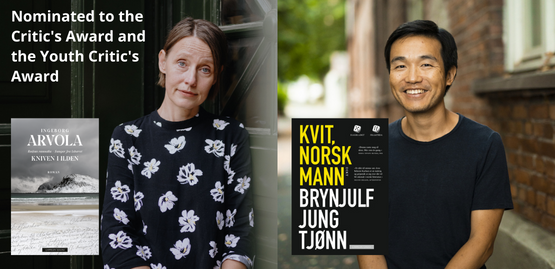
In the past week Ingeborg Arvola and Brynjulf Jung Tjønn have both been nominated to The Critic’s Award for best work of fiction, and to The Youth Critic’s Award.
For The Knife in the Fire by Ingeborg Arvola, this marks four nominations to some of the most prestigious national awards. It was nominated for The Bookseller’s Award, and won The Brage Prize in the Best work of fiction category. The Knife in the Fire has been Arvola’s great breakthrough, remaining amongst the very top selling books in Norway since its publication in August. Excluding crime fiction, it was the third best-selling fiction title in Norway last year. Presently, rights have been sold to ten different languages.
Jury of The Critic’s Award on The Knife in the Fire
Rarely does it happen that a writer gets a stunning breakthrough after 20 years of writing. But it has in fact happened with Ingeborg Arvola and her Knife in the Fire, the first book in the series Rujian rannalla, or Songs from the Arctic Ocean. Arvola is herself half Kven minority, and the author’s great-great-great grandmother has served as inspiration for the novel’s main character, Brita Caisa. The Knife in the Fire alludes to her practice of traditional folk medicine and warm hands. In 1859 she starts her journey from Finland to the Varanger fjord. With her are two young sons, which she has had out of wedlock. Words like wonderful and epic have been used about this historical novel, which is built around a quite simple love triangle story about fierce passion and ruthless love. Its strength lies in the many minor stories, in the rendering of the kven and samí environment and their relation to the Norwegian judiciary system. Arvola has a precise and beautiful language, a broad, varied and credible cast of characters and a convincing rendering of environments and nature.
A new Norwegian classic
Brynjulf Jung Tjønn is the author behind another defining book of 2022. White, Norwegian Man is a collection of poetry that depicts the author’s experiences of racism, as a child adopted from Korea by Norwegian parents. The book was the best-selling poetry collection in Norway last year, and has received fantastic reviews all around. Many critics are of the opinion that this is a future classic in Norwegian literature, and a book that should be read by all. Now, White, Norwegian Man is nominated for both The Critic’s Award and The Youth Critics Award.
Jury of The Critic’s Award on White, Norwegian Man
In a number of books, Brynjulf Jung Tjønn has encircled otherness and social maladjustment. In the poetry collection White, Norwegian Man, he directly addresses his own experience as an adopted child from Korea, relocated to a small village by the Sognefjord. With short, poetic sentences devoid of emotion, he shows how life as a person of Asian descent in an all-Norwegian environment is an almost bizarre experience. The little boy is allergic to most things that surround him – wool, hay and milk – and he has no other culture than the white Norwegian, with a burning desire to be just what the title says: white and Norwegian.
In quick flashes we experience events in Tjønn's life, and the form assigns the task of reacting emotionally to the reader. It's as if the author is just saying, "Here you go, there it is." In this way, this short book becomes an excellent gateway into something that very few people in this country get to experience - the absolute experience of being a stranger in situations characterized by awkward goodwill and a lack of insight, but also living with a vague threat of potential brutality.
The winner of The Critic’s Award will be revealed on the 2 of March.
The winner of The Youth Critic’s award will be revealed on the 31 of March.